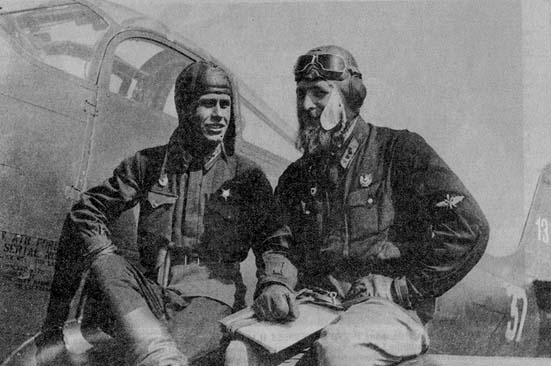In August of 1942, Klubov entered front-line duty as a fighter pilot. In one
of very hard battles over Mozdok, his I-153 suffered heavy hits. The plane
caught fire, and Klubov was forced to bail out, but not before flames had badly
burned his face and hands. Despite many weeks in the hospital, Klubov's skin
remained scarred. In the autumn of 1942, Klubov was awarded the Red Flag
Medal. By early 1943 he returned to front line duty with the 16 GvIAP,
commanded by famous
Alexander Pokryshkin . The unit entered battle 9 April 1943 and by the end
of that month, had been in 28 air battles, in which Soviet pilots downed 79
aircraft of the following types: 14 Bf 109E, 12 Bf 109F, 45 Bf 109G, 2 FW 190, 4
Ju 88, 1 Do 217, and 1 Ju 87. The most successful pilots of this period were:
Cpt. A. I. Pokryshkin - 10 Bf 109, Sen. Lt. V. I. Fadieyev - 12 Bf 109 and Sen.
Lt. G.A. Rechkalov - 7 Bf 109 + 1 Ju 88. Under Pokryshkin's leadership and with
daily exposure to heavy combat, the young pilots got a lot of experience (or
died...).
The following is an excerpt from Alexander Pokryshkin's book "The Sky of
War", devoted to young Soviet pilots. This is an episode during the fierce
Battle of Kuban in the summer of 1943, when the 16th GvIAP flew P-39 D
Airacobras.
""...They flew their sorties without interruption, with heroism and battled with
great skill. Klubov, Trofimov, Sukhov, Lukianov, and Zherdiev. Not long ago,
they were new and inexperienced. Now they lead big formations and successfully
fulfil combat missions in extremely difficult conditions. Especially
distinguishing himself with courage and total control of his aircraft, was
Alexander Klubov. He was calm, and a little phlegmatic on the ground, but in
the air he totally changed. He was brave, determined, and full of initiative.
Klubov did not wait for the enemy, he tried to find him. He had the special
"spirit" of a fighter pilot.
One day, we got very nervous about Klubov. It was sunset, his flying limit
had surely been reached, but Klubov had not returned from a reconnaissance
mission. Following my radio call, he simply replied: "I am in combat!" After
that, the radio went silent. I was worried that something could be wrong.
Suddenly his aircraft appeared, having been so long awaited by us. But he
flew in a very odd way. He flew down, then rapidly climbed again. It was obvious
that his steering system was damaged and only his will and excellent piloting
kept his plane in the air. I ordered him, by radio, to bail out, but he did not
hear me. His radio was damaged.
When his fighter began the landing manoeuvre, I was really terrified. I was
sure, that his "swinging" flight would end with a ground crash. But Klubov kept
the machine in control and landed successfully without his landing gear down.
Aviators, standing on the runway, rapidly ran to help him, but Klubov climbed as
calm as ever out of his cockpit. He walked around his plane, wondering over all
the many bullet holes and said to his aircraft, "You fought very well, my
friend!"
Klubov said nothing about his duel with six Messerschmitts, nor that he had
shot down two of them."
Alexander Klubov, was twice (on 13 April 1943, and then posthumously, on 27
June 1945) awarded the highest military award of the USSR, the Golden Star, as a
Hero of the Soviet Union. He flew 457 sorties and took part in 95 air combats.
He scored 31 personal victories and another 19 were claimed as 'group' kills.
On 10 October 1944 (some sources say on 1 November 1944), Klubov was killed in
the crash landing on the Jezowe airfield (25 km from Stalowa Wola, Poland). It
was a training flight in the new La-7 fighter, and there was a malfunction of
the plane's hydraulic system.
Klubov's friends from 16th GvIAP during battle break. Most successful of the
P-39 D-2 pilots, commander of 3rd squadron from 16 IAP, Sen.Lt Vadim I. Fadieyev
(right) and his wingman Lt Andriey I. Trud (left). In the background is
Fadieyev's P-39 D-2 41-38428, tactical code "37". Fadieyev recorded 394 battle
missions, 51 combats, 17 alone kills and other 3 group victories. Flew on P-39
D-2 (since 9 April 1943 till 5 May 1943), he downed 14 Bf 109 and 1 Ju 87. He
was KIA on 5 May 1943 on a lone fight against group of 12 Bf 109's.

